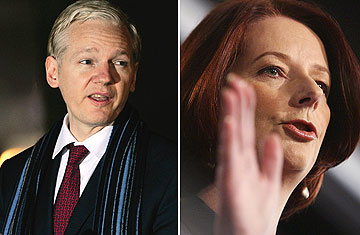
Australian Prime Minister Julia Gillard, right, seems unlikely to intervene on behalf of Julian Assange, left
On Feb. 4, a week before Julian Assange's extradition hearing in London, thousands of people gathered in Melbourne at a free-speech forum. The star of the show was the WikiLeaks founder himself, who delivered a pre-recorded video message to the crowd. "I can't wait to be back in Melbourne, where I have fond memories of taking a tram up Swanston Street, dropping in at Trades Hall and having my favorite coffee at the New International Bookshop," he said, playing the crowd like a rock star. After comparing his fight for transparency to the American struggle for civil rights, he ended with an appeal to Australia's Prime Minister: "Julia Gillard should be taking active steps to bring me home."
That, of course, hasn't happened. Assange is still in London awaiting the results of the hearing. If he loses, he will be handed over to Sweden to face sex-crime allegations. From there, he could face extradition to the U.S., where a stay at a military prison like Guantánamo Bay and the death penalty are possibilities, his lawyers say. That has Australian legal experts, rights groups and politicians wondering if Australia will help him out.
So far, Julia Gillard's government has offered Assange little other than condemnation. In December, the former lawyer described his role in WikiLeaks as "illegal" before an investigation by the Australian Federal Police found he had committed no crime under Australian law. In response to Assange's appeal, Gillard told Australian media that "there's not anything we can or, indeed, should do about that." She added that she doesn't "go around issuing invitations to come to Australia," but that Assange was entitled to enter the country "unless there is some legal obligation keeping him overseas."
Indeed, Australian lawyers say there is not much the country should do while Assange is caught up in the British court system. "If the extradition request fails then Assange could return home," explains Donald Rothwell, a professor of international law at the Australian National University. However, that could change if he is extradited to Sweden. If he does end up there, the Australian government would have a "stronger obligation" to intervene through diplomatic channels.
That obligation relates to the risk of extradition to the U.S., where federal prosecutors are reportedly building a case against Assange. Geoffrey Robertson, Assange's lawyer, has told the court that sex-assault cases in Sweden are regularly "tried in secret behind closed doors in a flagrant denial of justice." He believes that from Sweden, Assange could be extradited to the U.S. where he could be sent to Guantánamo Bay or even be sentenced to death. Adding to doubts about Assange's potential safety in the U.S., Sarah Palin has already said that Assange should be "hunted down," while fellow Republican Mike Huckabee has called for his execution.
"Public threats to Assange in the United States have not been treated as incitements of violence, says Robert Stary, a Melbourne-based lawyer who works with Assange. He believes his client deserves more help from his country. "If Assange was a U.S. citizen then government emissaries would be sent overseas to intervene," he says. "Australia has been conspicuous by its silence. They have abandoned him, and he has not committed an identifiable offense."
It's a position shared by many Australians, who worry their government has abandoned Assange to appease the U.S. In December, 200 prominent (and mostly Australian) figures, signed a letter asking Gillard to step in. There have been several rallies in his support, included a gathering in Brisbane shortly after the flood there. One of the most vocal government critics is Assange's mother, Christine Assange. "This is the time for Julia Gillard to stand up and say [to the U.S.], 'You are an ally but we think you're going down the wrong path on this issue and we can't walk down that path with you.'"
So far, Gillard seems unlikely to budge, and some analysts don't believe she should. Michael Fullilove, the director of the Global Issues Program at the Lowy Institute for International Policy, a think tank in Sydney, believes the WikiLeaks dump of information was too random. In December, he blogged that WikiLeaks has failed to exercise its duty of care to maximize the good effects and minimize the bad effects of its leaks. Fullilove told TIME that "Mr. Assange should be given exactly the same consular assistance in his legal proceedings as any other Australian," but said he would be "surprised" if Canberra accepted his request for special treatment. In other words, Assange may be on his own.
